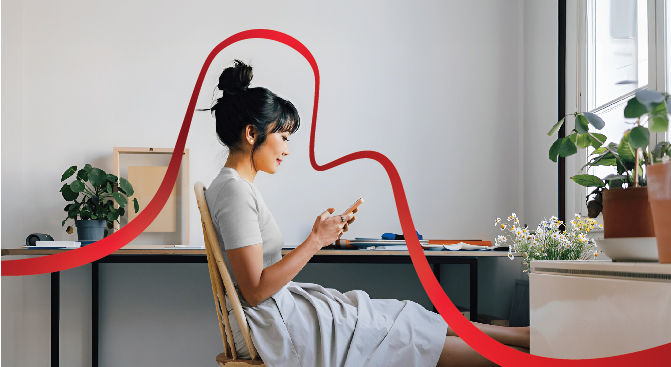
How retail therapy can help you cope
When you are going through a stressful time or having a significant transition in life— a breakup (ouch!) or maybe changing jobs or the environment you’re in, do you get a strong urge to go shopping?
You are not alone. Psychologists have known for years that shopping produces positive feelings for those who indulge in it. While shopping is not actually a form of formal therapy, its effects can feel therapeutic and helpful to a shopper.
Why shopping feels good
Shopping activates the pleasure centers of the brain and releases dopamine, the “feel good” hormone. That’s the basic biological, organic benefit we get. However, there are other mental and psychological benefits we experience from it.
Provides creative expression and aesthetic pleasure. Those who fancy themselves as having good taste will usually look for items that meet certain standards of design, aesthetics, and material quality. Just talk to someone who loves choosing fashionable outfits and accessories and see how their eyes brighten and their voices take on a tone of pleasure and awe.
Gives a sense of order and control. Going through a major life transition can be exciting but it is also a source of uncertainty and doubt: new responsibilities and challenges can seem daunting. However, when we shop for items related to the transition, we feel a sense of control and mastery. Say you’re moving out of your parents’ house and going solo becomes overwhelming. The act of shopping for your furniture and other household needs brings order to a mind cluttered by worry.
Serves as a form of relaxation, entertainment, and escape. Shopping involves visioning and anticipation. We imagine the items we will purchase and how our life will improve with their use. This lowers our stress level and can entertain us to the point where we escape more unpleasant preoccupations.
Boosts our confidence. “Power dressing” often means buying outfits that send a positive message about ourselves and our capabilities. From suits to shoes, to accessories, we can emanate a vibe of mastery and confidence during interviews, meetings, or even an ordinary workday if we choose our outfits right.
With all these feel-good benefits, shopping can surely be beneficial to your mental health. But one must be warned: even with the positives of shopping can come the negatives. We must be careful not to go overboard. For one, it can affect your financial health.
Many people risk accumulating credit card debts from shopping when they lose control of their spending. In such cases, shopping has become unhealthy.
One expert says shopping, like alcohol consumption, is best enjoyed in moderation. Too much shopping can be harmful. Apart from the mounting credit card debt, other warning signs can include missing out on work, studies and other important tasks because of shopping; or feeling anxious, irritable or annoyed while shopping and yet being unable to stop. There’s a line between retail therapy and retail addiction that we should not cross.
How to stay in the “healthy shopping zone”
Be more mindful about your motivation for shopping. Instead of letting your appetite for spending control you, stay aware of why you are shopping. There’s no harm in shopping to feel good but keep your purchases reasonable and within your means.
Use credit cards carefully. If you notice a tendency to be too fast and loose with your credit card use, don’t bring them every time you shop. Commit yourself to leaving your credit cards at home unless you really need them. If you’re into online shopping, make sure that you don’t save your credit card information to avoid that one-click purchase. It’s easier to control spending when you are paying in cash.
Try window shopping. Who says that you have to buy something each time you go to the mall? It turns out that we can get all the benefits of shopping even by just looking around and “visioning” ourselves enjoying our imagined or planned purchases. This applies to both shopping in a physical mall or online.
These are trying times for our health and finances, as we go through a pandemic and the community quarantine; but we can still find health and wellness in some of our seemingly mundane activities. Once the shops and malls open again, let’s keep on shopping—but in a healthy, smart, beneficial way.
---
References:
1. Why "Retail Therapy" Works https://www.psychologytoday.com/us/blog/the-why-behind-the-buy/201305/why-retail-therapy-works
2. Is Retail Therapy Really Therapeutic? New Data Speaks https://www.forbes.com/sites/lorihil/2017/11/29/is-retail-therapy-really-therapeutic/#2b87326f67ec
4. Memorial Day Sales: 5 Health Benefits Of Shopping https://www.medicaldaily.com/memorial-day-sales-5-health-benefits-shopping-246157
5. Retail Therapy: Does It Help? https://www.forbes.com/sites/rent/2015/09/03/retail-therapy-does-it-help/#277b02a06c88
6. Health & Wellness: 5 reasons why mall shopping is good for your health https://www.heraldextra.com/momclick/health-and-fitness/health-and-wellness-column/health-wellness-reasons-why-mall-shopping-is-good-for-your/article_43c19e10-7a14-5fc2-83cf-58943782e312.html

